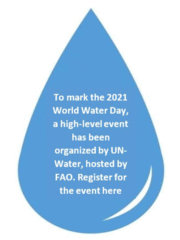World Water Day 2021 - Valuing Water: addressing water scarcity in agriculture is crucial in valuing water
Celebrating the World Water Day is part of the life of WASAG
Every year, 22 March has been set aside to mark World Water Day. The 2021 edition titled “Valuing Water” will be celebrated in a virtual event globally. Since its establishment in 2017, the Global Framework on Water Scarcity in Agriculture (WASAG) hosted by FAO’s Land and Water Division, through its network of Partners, has continued to address issues related to water scarcity in agriculture in a changing climate. In 2019, WASAG celebrated the World Water Day during its First International Forum on Water Scarcity in Agriculture, which took place in Praia, Cabo Verde. Last year, the WASAG celebrations of World Water Day 2020, which focused water and climate change, were quickly moved online. These celebrations showcased FAO and WASAG partners’ active support to countries to adopt climate change mitigation and adaptation strategies as well as improved agriculture water management practices for achieving local and global food security. With agriculture being responsible for around 70 percent of water withdrawals, addressing water scarcity in agriculture – which is the core mission of WASAG – is more than key to valuing water.
In the midst of the current COVID-19 pandemic situation, WASAG continues to advocate on the value of water and the need to grow more nutritious food per drop of water. This is done by engaging policy makers, researchers, scientists and government representatives in agriculture and other sectors. The 2020 WASAG Webinar Series offered the opportunity for Partners and Stakeholders to build capacity, cooperate on work programmes, and develop new and improved solutions to water scarcity challenges. To date, ten webinars have been organized by WASAG, with 2870 participants representing 135 countries or regions, proving a good response to a recognized need, which resulted in the success of this initiative. The webinars covered topics such as women and water scarcity, saline agriculture, bridging financing gaps for agriculture under climate change, collaboration on promoting quinoa, water and nutrition, pandemic/epidemics, drought and agriculture, sustainable agriculture water use and scaling up water and agriculture practices for rice intensification. More webinars are planned for 2021. They will further highlight the valuing water and identify new paths of working and addressing pressing issues related to water scarcity in agriculture and promoting integrated approaches such as for sustainable dryland agriculture.
The WASAG Framework on Financing Mechanisms which will be published in 2021 further illustrates WASAG’s efforts on valuing water, with its three pillars: de-risking and risk sharing tools, financial support mechanisms to build trust to attract funding and on-the-ground activities to generate and capture value. The framework will guide WASAG’s work to maximize the value of water and its economic, social and environmental benefits. Another key action taken by WASAG recently is to coordinate efforts with Partners in promoting drought and saline tolerant crops such as quinoa.
The new WASAG Strategy for 2021-2024 focuses on four key actions areas, including development of initiatives to address water scarcity, innovation and data, research and training, and awareness raising. Since the value of water varies depending on the climatic regime, from arid to humid regions, as well as on the demand and supply, resulting in surplus or shortfalls, WASAG aims to tailor its response to countries and specific needs in the new strategy, with provision for regional hubs and country chapters as relevant. Climate change and the increasing world population all call for innovative approaches in maximizing the value of water for food and nutrition security.
WASAG’s work is guided by the needs of countries, as illustrated by the close collaboration with Cabo Verde in developing climate resilient agriculture through different initiatives that are being pursued. As expressed during the sessions of FAO’s Committee of Agriculture (COAG) of 2018 and 2020, several countries support the work of WASAG and are increasingly reaching out to WASAG. During the 27th session of COAG of October 2020, the following countries specifically intervened in various ways for guidance and recommendations to WASAG: Argentina, Australia, Brazil, Cabo Verde, Egypt, Germany, Iran, Mali, Peru, Russia, Senegal, Sudan and Switzerland.
The commitment of WASAG’s Partners and stakeholders is highly valued and appreciated. FAO, the host Partner, continues to provide operational, administrative, and technical support to WASAG. WASAG also enjoys significant support from Switzerland through its Federal Office for Agriculture (FOAG). Cabo Verde recently provided office space and personnel to serve as a WASAG desk in Praia, Cabo Verde. The Italian and Cabo Verdean chapters of WASAG have agreed to train a professional from Cabo Verde on modern irrigation technologies under a scholarship for Master’s degree in CIHEAM Bari, Italy, through the efforts of WASAG. The Government of Quebec, Canada supports WASAG through an internship programme that provided two interns from Quebec whom have worked in the WASAG Support Team. All and all, WASAG is a lean structure that aims to deliver maximum value through the combined commitments of its Partners.
On this year’s World Water Day, we celebrate the work of our Partner and Stakeholders, the commitment and dedication of our working groups and the leadership of our Steering Committee. We continue to rely on the Partners and welcome new Partners who join WASAG in strengthening the momentum towards new collaborative innovative ways to turn water scarcity in agriculture into an opportunity for sustainable food security despite climate change. These are firm steps towards achieving WASAG’s vision of a world whose food systems are secure and resilient to increasing water scarcity in a changing climate. Addressing water scarcity in agriculture is thus crucial in valuing water and to WASAG’s vision.
Have a happy World Water Day 2021!

